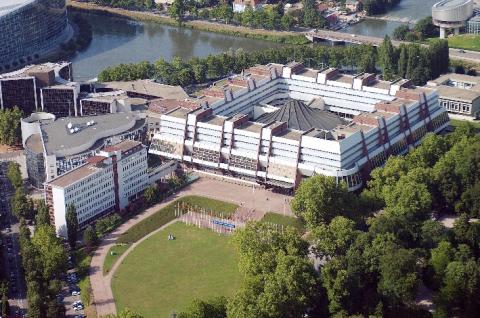Crackdown on illegal internet use spreads to Europe

Added to the recent passage of anti-piracy legislation in the UK and France, a new EU proposal signals a continent wide crackdown on illicit internet use. By Joe Galvin.
Last Monday, EU ministers put forward proposals to set up a European cybercrime unit as part of a long term strategy to tackle the problems of fraud, illegal downloading and child pornography. The aim is to develop a harmonious, EU wide legal system to deal with illegal internet use.
(Pictured: Council of Europe building)
At the moment, disparate laws and regulations across the 27 member states make it difficult to tackle cross-border illegal internet use; for example, at the moment a scammer can easily set up a bogus company in one state to defraud victims in other countries. The EU hopes that this new cybercrime unit will put an end to such internet abuses by implementing new preventive and investigative measures, and by training police and legal teams to specialise in the field of cybercrime.
As it stands, EU states have still to ratify the Council of Europe's Convention on Cybercrime, and adopt a common position on issues such as IP blocking and domain name revocation. A drive to achieve more ratifications of this treaty is now underway, and any attempts to establish a European cybercrime unit hinges on its EU-wide approval.
The establishment of an EU cybercrime centre would be the third major initiative aimed at tackling illegal internet use in Europe since the beginning of this year. In January, France introduced a stringent "three strikes" anti-piracy law, where illegal downloaders are brought to court on their third offence. This was followed by the Digital Economy Act in the UK, which has much the same provisions as the French legislation. It was brought into force last month.
However, the rise of such legislation across Europe has met with strong opposition. In Sweden, the single issue Pirate Party won two seats at the European Elections in 2009. Its success inspired the growth of Pirate Parties across Europe, including the UK and Ireland, and the parties have now merged together under the same banner.
The popularity of the Pirate Party movement largely stems from those who simply want to download copyrighted material for free. However, more serious questions regarding internet freedom are raised by the dramatic increase in anti-piracy and cybercrime initiatives; the initiatives necessitate the widespread monitoring of internet use by individuals, and may result in the censorship of certain sites. Jo Glanville, of the Index on Censorship, has said that "the internet has been a revolution for censorship as much as free speech". As the monitoring of internet use grows, so it becomes easier to censor undesirable sites.
The solution, for many, will be to migrate to anonymous communication networks such as Freenet (previously discussed on this site) and Tor. When France announced its intent to crack down on illegal downloading, Freenet's use by French nationals mushroomed. Currently, more Freenet users hail from France than from any other nation. It is reasonable to expect increasing anti-piracy and cybercrime legislation across Europe will lead to similar usage booms for Freenet and Tor.
Attempting to tackle issues such as child pornography and internet fraud is undoubtedly laudable, and harmonising laws across the EU would certainly aid individual nations in combatting cybercrime. However, as internet legislation continues to expand and develop, it is important that European citizens remain wary of potential threats to their freedom and ability to communicate anonymously.
